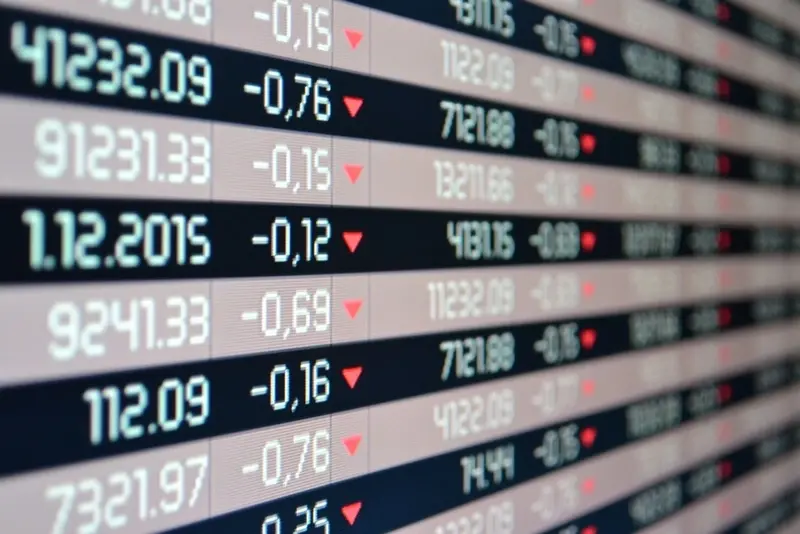
Stock prices in London remained in the doldrums on Friday at midday in a soft start to the second half of what has, so far, been a brutal year for equities.
‘The market remains focused on downside risks to growth. UK data did not help in that respect, with the details of the Q1 GDP report clearly showing the challenges facing the UK economy and the Bank of England in coming quarters,’ said Bank of America in a note.
The data, released on Thursday, showed the UK economy grew an unrevised 0.8% in the first quarter, slowing from a 1.3% expansion in the fourth quarter.
‘Price action remains extremely volatile, with the volatility spike concentrated in Europe,’ BofA added.
The FTSE 100 index was down 17.02 points, or 0.2%, at 7,151.95 midday Friday. The FTSE 250 index was down 72.58 points, or 0.4%, at 18,594.20. The AIM All-Share index was down 2.65 points, or 0.3%, at 873.57.
The Cboe UK 100 index was down 0.3% at 713.88. The Cboe 250 was down 0.7% at 16,191.25, and the Cboe Small Companies was up 0.3% at 13,313.87.
In mainland Europe, the CAC 40 stock index in Paris and the DAX 40 in Frankfurt were both down 0.1%.
In the FTSE 100, North Sea-focused oil company Harbour Energy was the worst performer, down 3.1%, tracking a plunge in oil prices.
Brent oil was quoted at $110.85 a barrel Friday at midday, down sharply from $114.74 a barrel at the London equities close Thursday.
Precious metals miner Fresnillo was down 2.1%, tracking spot gold prices lower. Gold was quoted at $1,790.22 an ounce, down from $1,807.91 late Thursday.
Abrdn was down 1.5% after Citigroup downgraded the asset manager to 'sell' from 'neutral'.
BT Group was down 0.5% after staff at telecommunications company voted to strike, union bosses announced Thursday, joining workers in various UK sectors protesting over pay as decades-high inflation erodes wages.
Dave Ward, general secretary at the Communication Workers Union, said BT now faces its first national strike since the company's privatisation in the 1980s after a ballot in favour of walking out. It comes after strike action in recent days by tens of thousands of rail workers in addition to stoppages held by senior criminal lawyers.
Separately, BT said BT Sport has retained the majority of the rights to the UEFA Champions League, Europa League and Europa Conference League, though its stranglehold on Europe's elite club football tournament ended.
The costs of the rights awarded to BT Sport is £305 million per year.
US tech giant Amazon.com secured live rights to the Champions League in the UK for the first time from 2024. Amazon will have the first pick of matches on a Tuesday.
The UK deal is understood to be worth around £500 million a year to UEFA for the three seasons between 2024 and 2027, an increase of 20% on the current cycle.
In addition, the BBC will show highlights of the Champions League from 2024, the first time the state-owned broadcaster has had access to European football's elite club competition.
In the FTSE 250, Wizz Air was the best performer, up 7.2%, after Redburn upgraded the Hungarian airline to 'buy'.
The pound was quoted at $1.2070 at midday on Friday, down from $1.2157 at the London equities close Thursday, after UK manufacturing sector activity fell to a two-year low in June.
The S&P Global-CIPS UK manufacturing purchasing managers' index fell to 52.8 in June from 54.6 in May and was revised down from an initial estimate of 53.4. It was the lowest reading in two years.
S&P said the slowdown in the UK manufacturing sector continued at the end of the second quarter, as June saw output growth grind to a near-standstill pace and new orders contract for the first time in 17 months.
In addition, S&P said inflationary pressures remained elevated due to raw material shortages, stretched supply chains, higher prices for commodities, electronics, energy, oil, paper, plastics and timber.
The euro was priced at $1.0465 at midday, up from $1.0456 late Thursday after data showed inflation in the eurozone surged further.
Consumer inflation in the eurozone is expected to tick higher in June, data from the statistical office of the EU showed, piling further pressure on the European Central Bank to rein in spiralling prices.
Euro area annual inflation is expected to be 8.6% in June 2022, accelerating from 8.1% in May, according to a flash estimate from Eurostat. Market consensus, cited by FXStreet, had seen inflation at 8.3%.
‘Near-term we expect euro area food price inflation to rise further over the summer and stay at levels above 8% at least for the remainder of this year, as higher input costs continue to exert upward pressure,’ said Danske Bank.
Meanwhile, the manufacturing sector in the eurozone had a rough month in June, data from S&P Global showed, as firms faced slowing demand and a drop in new orders.
The S&P Global eurozone manufacturing purchasing managers' index fell to 52.1 in June from 54.6 in May, which represents a 22-month low. Any reading over the no-change mark of 50.0 indicates growth, signalling that June's rate of expansion slowed significantly compared to May.
Against the safe haven Japanese yen, the dollar was trading at JP¥135.55, lower against JP¥135.89.
US stock market futures were pointed to a lower open on Friday ahead of S&P and ISM PMI readings.
The Dow Jones Industrial Average was called down 0.1%, the S&P 500 down 0.4%, and the Nasdaq Composite down 0.1%.
On Wall Street, Micron Technology shares will be in focus after the semiconductor maker, late Thursday, reported a rise in third-quarter earnings. However, the firm warned on a weakening industry demand environment.
Micron reported revenue for third quarter ended June rose 14% to $8.64 billion from $7.42 billion a year before. Net income grew 51% to $2.63 billion from $1.74 billion, and diluted earnings per share rose 54% to $2.34 from $1.52.
The stock was down 5.0% in pre-market trade in New York.
Copyright 2022 Alliance News Limited. All Rights Reserved.




